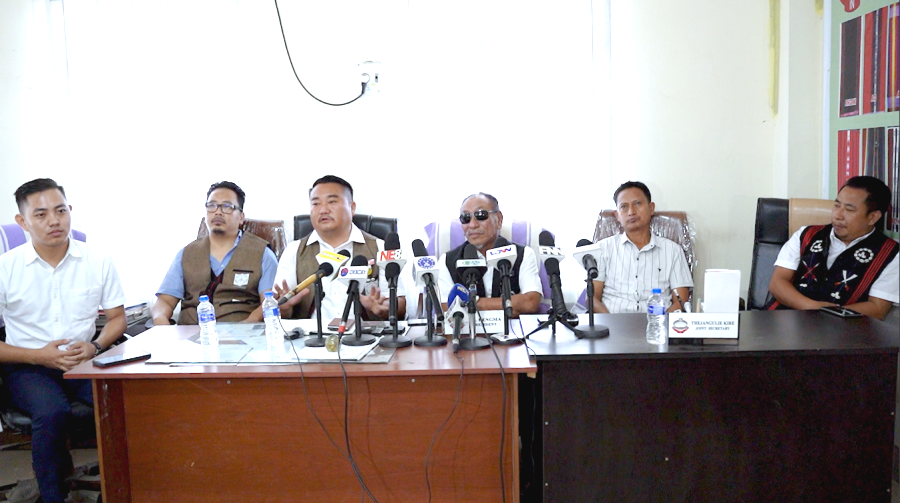Naga Council Dimapur and East Dimapur CSOs jointly demand repeal of Nagaland’s NLTP Act, citing failure of prohibition.
Share

DIMAPUR — A growing chorus for lifting Nagaland’s three-decade-old liquor prohibition grew louder on Wednesday as the Naga Council Dimapur (NCD) and several civil society organisations (CSOs) from East Dimapur came together to demand the repeal of the Nagaland Liquor Total Prohibition (NLTP) Act, 1989.
The consultative meeting, held at the NCD office, brought together representatives from the East Dimapur Village Council Chairmen Forum (EDVCCF), East Dimapur GBs Association (EDGBA), East Dimapur Naga Youth Organisation (EDNYO), Tribal Council Purana Bazaar (TCPB), Naharbari Community Citizens Forum (NCCF), and the East Dimapur Business Association (EDBA).
The discussions centred on what participants described as the “failure” of prohibition and the need for a more practical approach to alcohol regulation in the state.
Speaking to the media after the meeting, NCD President GK Rengma said that this was the first consultative meeting with East Dimapur CSOs on NLTP issue. He maintained that the NCD could not take any steps without the support of CSOs and the public.
Also read: Dimapur-based civil society organisations renew call for lifting Nagaland liquor prohibition Act
Expressing satisfaction with the outcome, Rengma said that the participants had unanimously agreed to advocate for the repeal of NLTP Act in Dimapur.
Dimapur Urban Council Chairmen Federation (DUCCF) President Zasivikho Zakiesato, who also serves as the convener of the committee for lifting the NLTP Act in Dimapur, informed that the meeting lasted over three hours and saw all participants take a common stance in favour of repealing the Act.
WATCH MORE:
He announced that 14 organisations from Dimapur and East Dimapur have now united in support of repealing the Act. These include the DUCCF, Naga Women Hoho Dimapur, GB Union Sardar, Dimapur Naga Students’ Union, Dimapur District Citizens Forum, Dimapur District GBs Association, Business Association of Nagas, Dimapur Chamber of Commerce and Industry, EDVCCF, EDGBA, EDNYO, TCPB, NCCF, and EDBA.
Zakiesato said that the door remained open for other organisations to join the cause and added that a committee would soon be formed to decide on submitting a representation and the future course of action.
Responding to concerns about the possible impact on youth if the Act is lifted, Zakiesato observed that alcohol is already widely available despite prohibition, arguing that lifting the Act would not significantly change the current situation.
He attributed the rise in drug abuse among youth to the failure of prohibition, saying, “We’re doing what’s best for Dimapur.” He stressed that as Christians, both legislators and CSO leaders must make practical decisions, acknowledging the Church’s moral stance against lifting the Act but urging a realistic approach to the issue.
EDVCCF convener Aheto Yepthomi lauded the NCD for taking the initiative. While acknowledging that drugs and alcohol are harmful to society, he said that 36 years of prohibition had done more harm than good.
Yepthomi said that the Act has led to the spread of adulterated alcohol, ruining many young lives, and pointed out that bootlegging was rampant across Dimapur.
EDNYO President Kanato Awomi questioned whether the state government has genuinely implemented the Act. He pointed to the widespread availability of adulterated alcohol and supported the call to lift the Act and explore alternative measures.
DNSU Vice President R Michael Yanthan said that the demand to repeal the Act was based on practical considerations rather than emotions. He noted that the state was losing approximately INR 600 crore annually due to prohibition and suggested that legalising alcohol could generate significant revenue.
Secretary of the committee for repeal of the NLTP Act, Dr. Kahuka Sema, clarified that the committee’s intention was not to oppose the Church but to reflect the will of the people. “We cannot ignore the reality on the ground; we must stand for what is right,” he said.
From a medical perspective, he added that lifting the Act would enable quality control of liquor entering the state, as prohibition has led to the rampant sale of adulterated alcohol.